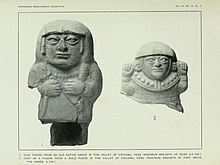Talal Asad
Talal Asad | |
|---|---|
| Born | 1933 |
| Nationality | Saudi and American |
| Scientific career | |
| Fields | Anthropology |
| Academic advisors | E. E. Evans-Pritchard |
| Notable students | Saba Mahmood David Scott Charles Hirschkind |
| Part of a series on |
| Anthropology of religion |
|---|
 |
| Social and cultural anthropology |
Talal Asad (born 1933) is an anthropologist at the CUNY Graduate Center.[1]
Asad has made important theoretical contributions to post-colonialism, Christianity, Islam, and ritual studies and has recently called for, and initiated, an anthropology of secularism. Using a genealogical method developed by Friedrich Nietzsche and made prominent by Michel Foucault, Asad "complicates terms of comparison that many anthropologists, theologians, philosophers, and political scientists receive as the unexamined background of thinking, judgment, and action as such. By doing so, he creates clearings, opening new possibilities for communication, connection, and creative invention where opposition or studied indifference prevailed".[2]
Biography
He was born in Saudi Arabia to Austrian Pakistani diplomat, writer and reformer Muhammad Asad, a Jew who converted to Islam in his mid-20s, and a Saudi Arabian Muslim mother, Munira Hussein Al Shammari (died 1978).[3]
Critical thematics
William E. Connolly attempts to summarize Asad's theoretical contributions on secularism as follows:[4]
- Secularism is not merely the division between public and private realms that allows religious diversity to flourish in the latter. It can itself be a carrier of harsh exclusions. And it secretes a new definition of "religion" that conceals some of its most problematic practices from itself.
- In creating its characteristic division between secular public space and religious private space, European secularism sought to shuffle ritual and discipline into the private realm. In doing so, however, it loses touch with the ways in which embodied practices of conduct help to constitute culture, including European culture.
- The constitution of modern Europe, as a continent and a secular civilization, makes it incumbent to treat Muslims in its midst on the one hand as abstract citizens and on the other as a distinctive minority either to be tolerated (the liberal orientation) or restricted (the national orientation), depending on the politics of the day.
- European, modern, secular constitutions of Islam, in cumulative effect, converge upon a series of simple contrasts between themselves and Islamic practices. These terms of contrast falsify the deep grammar of European secularism and contribute to the culture wars some bearers of these very definitions seek to ameliorate.
Select bibliography
- The Kababish Arabs: Power, Authority, and Consent in a Nomadic Tribe. Praeger Publishers, 1970. ISBN 0-900966-21-1
- "Market Model, Class Structure, and Consent: A Reconsideration of Swat Political Organization." Man 7(1) (1972), pp. 74–89.
- Editor, Anthropology & the Colonial Encounter. Ithaca Press, 1973. ISBN 0-903729-00-8
- Genealogies of Religion: Discipline and Reasons of Power in Christianity and Islam. The Johns Hopkins University Press, 1993. ISBN 0-8018-4632-3
- Formations of the Secular: Christianity, Islam, Modernity. Stanford University Press, 2003. ISBN 0-8047-4768-7
- On Suicide Bombing. Columbia University Press, 2007. ISBN 978-0-231-14152-9
Further reading
See also
- Alasdair MacIntyre
- Saba Mahmood
- Charles Hirschkind
- David Scott
- Hussein Agrama
- Charles Taylor (philosopher)
- William E. Connolly
References
External links
- Alumni of the University of Edinburgh
- American anthropologists
- American Muslims
- Anthropologists of religion
- Pakistani emigrants to the United States
- City University of New York faculty
- American people of Austrian-Jewish descent
- American people of Pakistani descent
- American people of Saudi Arabian descent
- Living people
- 1933 births
- Postcolonialism
- Poststructuralists
